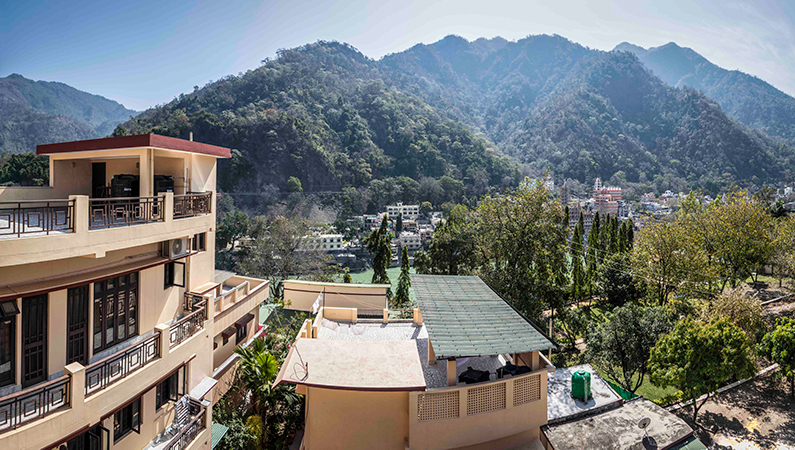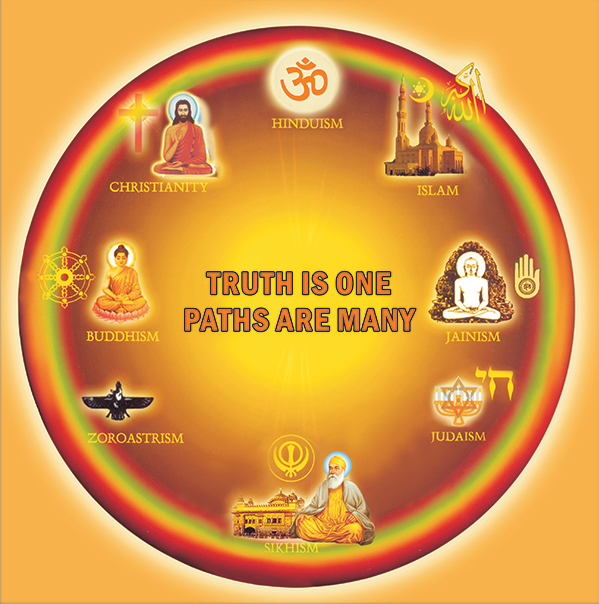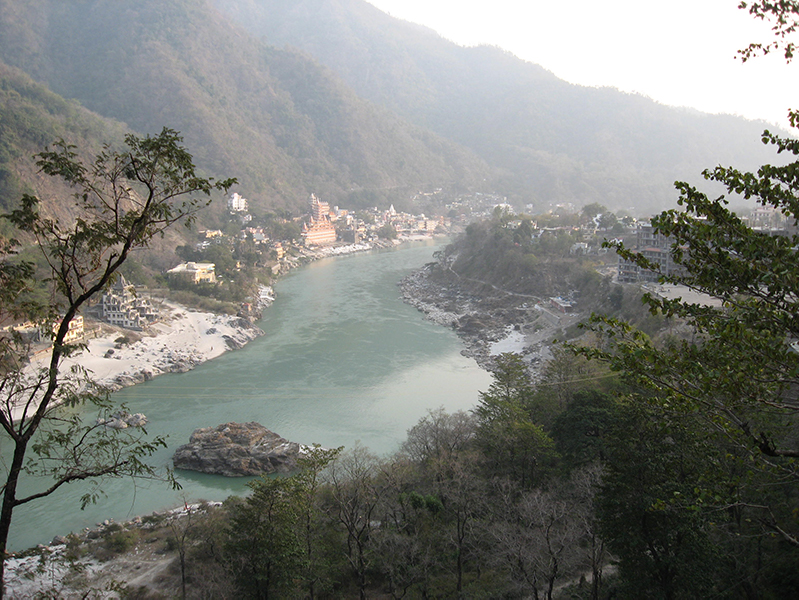Inauguration Message by H.H. Sri Chandra Swami Udasin
I extend my hearty good wishes to dear Swami Atmanandaji and pray that this Ashram may become...
READ MOREAjatananda Ashram originated in December 2003 in Tapovan, Rishikesh to fulfill Swami Abhishiktananda’s dream and vision of an interreligious monastic community on the banks of the holy Ganges. It was also deeply inspired by his disciple, Swami Ajatananda Saraswati who realized the timeless and Absolute Consciousness and disappeared mysteriously in the Himalayas in 1977. The ashram was named after him and entrusted to his gracious protection and divine guidance. It values silence, contemplation and Self-Enquiry. Due to its universal nature, the Ashram is not formally affiliated to any religious organization or institution. Since 2004, its management has been carried out by an independent non-profit organization, the Ajatananda Interreligious Trust (Regd).
As an essential contribution to the community of seekers, the ashram offers daily spiritual teachings, meditation sessions, monthly retreats, and spiritual guidance. Additionally, service and charity are rendered towards the poor and the needy through appropriate channels. Occasionally the ashram hosts events to promote interreligious harmony, such as the Interreligious Retreat-Seminars, and sessions with visiting spiritual masters of different traditions.
However, the essential purpose of the ashram is not to engage in activities, but instead to offer a place for monastics and spiritual seekers of different religious traditions to practice their sadhana with the support of an interreligious community.

Ajatananda Ashram has been created in the style of a matha, the traditional Indian equivalent of a monastery. It is a place where monks can devote themselves to spiritual practice and meditation.
The monk is a man who lives in the solitude of God, alone in the very aloneness of the Alone. He does not become a monk in order to do social work or intellectual work or missionary work or to save the world. The monk simply consecrates himself to God.
— Swami Abhishiktananda, 1958
The Ashram community is composed of both monastic and non-monastic spiritual seekers who pursue a life of renunciation with the sole intention of realizing the Truth. They follow traditional monastic rules and engage in selfless service, spiritual study, meditation, and Self-Enquiry. Their way is primarily to seek and realize their true Nature, the Self, or the Absolute through silent contemplation which leads to aparoksha–jnana (direct knowledge). The focus of the monastic path is the inner, contemplative life of being, rather than doing. It is the true path of non-doing (nirvritti-marga). To learn more about what an ashram is, you can also read: What Does an Ashram Stands For?.
Each member of our monastic community ultimately strives to discover the universal Oneness at the heart of all the world’s great religions and spiritual traditions, whatever their own background may be. This vision emphasizes direct spiritual experience rather than religion, as is reflected in our motto: “Truth Is One, paths are many”.

The call to complete renunciation cuts across all dharmas and disregards all frontiers (…). It is anterior to every religious formulation. In the end, it is in that call arising from the depths of the human heart that all the great dharmas really meet each other and discover their innermost truth in that attraction beyond themselves which they all share…
— Swami Abhishiktananda, 1975 [1]
For monastics who aspire to realize the Self or God, living together in the spirit of renunciation is an experience of mutual recognition and love, and a source of immense joy.
The different religions are like different paths leading to the Divine. Spirituality is common in all of them… All the religions, if followed with sincerity and purity of intention and deep aspiration, discover the Truth, lead to the Divine, the timeless infinite Consciousness unbound by time and space and the Law of Causation.
— Chandra Swami Udasin [2]
Ajatananda Ashram promotes the monastic path (sannyasa), which is the deepest spiritual meeting point of the major religions in India which have monastic traditions, namely Hinduism, Buddhism, Jainism and Christianity. Although all community members have not taken formal sannyasa, all are united in their endeavour to live its true spirit—a life of renunciation and contemplation. The interreligious dialogue that arises from such a monastic community is at the level of experience and loving relationships, and not only a philosophical interaction. Ajatananda Ashram is an experimental attempt to live together in the pure Presence of the Heart.
It is befitting that this ashram is on the banks of the holy River Ganga and in the foothills of the Himalayas, for it is here that the seers envisioned the universal nature of Spirituality… The Truth that is sought after is known by the enlightened as non-dual Consciousness. It is variously named Brahman, Supreme Spirit, Lord, etc. The Truth is expressed by different people according to their tastes. Though the expressions differ, the Truth remains one and changeless…
— Swami Padmanabhananda Saraswati [3]
Aside from some short prayers and chanting in the evening, the community life does not involve any rituals or common worship. Everyone is free to remain faithful to their religious faith and traditions, but meditation remains the central and common spiritual practice of all residents. In this shared silence, there is a profound sense of communion beyond all barriers.
[1] Swami Abhishiktananda, The Further Shore, Delhi, 1975, p.28.
[2] Chandra Swami Udasin, satsang, June 5, 1999.
[3] Swami Padmanabhananda Saraswati (Shivananda Ashram), on the occasion of the inauguration of Ajatananda Ashram, November 5, 2006.

The roaring of the Ganga reflects the unfathomable depths of silence… Nothing more to see, comprehend, or reflect upon. That is Fullness, the Bhuman [infinitude], the true Joy.
— Swami Ajatananda, Spiritual Diary, 1975
Ajatananda Ashram is situated on a hill overlooking the holy Ganges, whose spiritual nurturance and sacred vibration can be clearly felt. It is also near the sacred pilgrimage of Laxman Jhula, a few kilometres upstream from the town of Rishikesh.
This exceptional location, along with the beautiful scenery of the surrounding area, makes the ashram a truly unique and inspiring place for spiritual sadhana. Swami Abhishiktananda envisioned such an ashram, open to all religions, near the banks of the Ganges, nestled in the Himalayan foothills. Moreover, both Swami Abhishiktananda and Swami Ajatananda spent much of their time nearby, engaged in deep spiritual study and sadhana. Swami Ajatananda’s kutiya can still be found in Kaudiyala, just 38 kilometers upstream.
The Ashram is located in the Laxman Jhula and Tapovan area, which has been a sacred place of sadhana for hermits and spiritual seekers for thousands of years. ‘Tapovan’ means ‘forest of tapas’— tapas being the practice of austerities.
The great poet Kalidas said that Indian culture has three major pillars: detachment, austerity and tapas. This Ashram is situated in Tapovan. It is a place of detachment and austerity not only for Indians, but also for practitioners from all over the world.
— Swami Padmanabhananda Saraswati [1]
Over the years, many great sages have been drawn to Rishikesh and have established ashrams in the area. For example, just a few kilometres from Ajatananda Ashram are the tapasya hermitage and ashram of the world-famous Swami Shivananda, who also emphasized the need to focus on the universal Truth common to all religions. Pilgrims can also visit some holy caves located nearby, such as Mast Ram Baba Gupha, Vashishta Gupha and Rama Tirtha Gupha, to name just a few.
[1] Swami Padmanabhananda Saraswati (Shivananda Ashram), on the occasion of the inauguration of Ajatananda Ashram, November 5, 2006.
On November 5, 2006, Ajatananda Ashram was inaugurated and blessed during a ceremony presided by H.H. Sri Chandra Swami Udasin, the Spiritual Head and President of Sadhana Kendra Ashram (Domet, Uttarakhand). His Holiness spoke of our ashram—which is very dear to his heart—becoming “a genuine place of sadhana for seekers of Truth from different traditions”.
The interreligious function was attended by distinguished guests, monks and spiritual seekers of diverse religious traditions. Special Blessings and messages were sent by: H.H. Sri Swami Chidananda Saraswati, the late President of Divine Life Society; H.H. the 14th Dalai-Lama; H.H. the 41st Sakya Trizin, Head of the Sakyapa Tradition of Tibetan Buddhism; and H.H. Drikung Kyabgon Chetsang Rinpoche, Head of the Drikung Kagyu Order of Tibetan Buddhism.
I extend my hearty good wishes to dear Swami Atmanandaji and pray that this Ashram may become...
READ MOREThe God who is present everywhere in this human world of ours will also be present...
READ MOREEssentially, all religions lead us to discipline and transform ourselves so that we can...
READ MORE